| SHADOWS ON THE WALL | REVIEWS | NEWS | FESTIVAL | AWARDS | Q&A | ABOUT | TALKBACK | |||||
 Shadows off the beaten path Shadows off the beaten pathIndies, foreign, docs and shorts...
On this page:
LE BEAU MEC |
BROADWAY |
I LOVE YOU, BEKSMAN
| |||||
| See also: SHADOWS FILM FESTIVAL | Last update 29.Apr.23 | |||||
|
Le Beau Mec aka: Dude Review by Rich Cline | 
| |||||
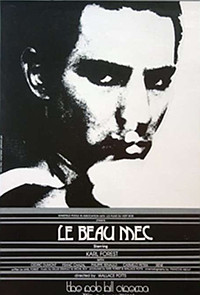 dir Wallace Potts scr Karl Forest prd Jean-Luc Brunet, Karl Forest, Wallace Potts with Karl Forest, Frank Chazal, Philippe Renaud Carmelo Petix, Rene, Cedric Dumont release Fr 14.Mar.79 restoration UK Mar.23 flare 79/France 1h10  Is it streaming? |
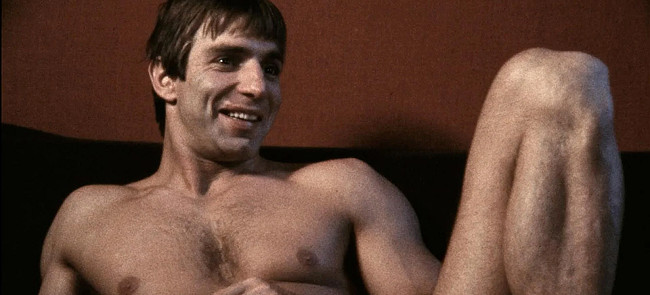 Thought to be lost, this vintage French arthouse pornography has been digitally restored, complete with its English overdub narration. Directed by Wallace Potts, Rudolf Nureyev's last lover, it's a sharply well-made movie with eye-catching style and remarkably dark themes. While it's very explicit, the film is also quirky and inventive, with sequences that catch the viewer by surprise. And it has an unusually personal perspective to its sexiest moments. In voiceover, a 27-year-old man (Forest) speaks about sexual encounters throughout his life, depicted in a series of vignettes. As two young men frolic naked in the woods, a uniformed Nazi watches them from afar. There are also lively experiences when as a teen he took an aggressive, tough-guy approach to avoid bigots and the law. But he still has several run-ins with the police. And then during his term of military service, he represses his sexual urges, perhaps pointlessly. Later, he works the streets as a hustler before starting a burlesque cabaret act. Infused with irony and dry wit, the film is engagingly offbeat. A sequence featuring a police uniform, handcuffs and a gun is hilariously camp. Forest looks thoroughly bored smoking a cigarette while being worshipped by a client in a hotel room, thinking about cash to maintain his interest. In one scene, he speaks to camera about his fascination with South American history and how he dreams of fighting in a war. The camera also watches him lovingly as he bathes and works out. And sex scenes are unusually naturalistic and exuberant. Made during the golden age of Parisian gay cinema and featuring Forest at the peak of his stardom, the film has a startling pedigree. Nureyev choreographed the cabaret sequence. And some camerawork is by Oscar-winning cinematographer Nestor Almendros. This print of the film was found in a garage in Alabama, where it had been stored for safety by Potts' brother. And while some of Forest's confessions reveal the period in context, others feel eerily prescient four decades later. This super-fit man knows he won't be this attractive forever, that in 10 years he'll need to find something else to do. In the meantime, he enjoys the power of his body, connecting with strangers while hoping for something deeper. But when he did fall in love, the boy didn't love him back. He recognises the dangers of indulging fantasies that leave him wanting more. So perhaps in the end, he only has himself. In other words, while this is indeed explicit porn, it's also thoughtful and challenging.
| ||||
|
Broadway Review by Rich Cline | 
| |||||
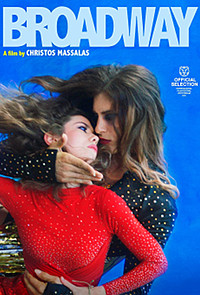 dir-scr Christos Massalas prd Amanda Livanou with Elsa Lekakou, Foivos Papadopoulos, Stathis Apostolou, Rafael Papad, Salim Talbi, Christos Politis, Lakis Gavalas, Pantelis Dentakis, Nicos Arvanitis, Antonis Koronaios, Nora Ukachukwu, Eleni Foureira release Gr 22.Sep.22, UK Nov.22 rff, US 28.Apr.23 22/Greece 1h37  Now streaming... |
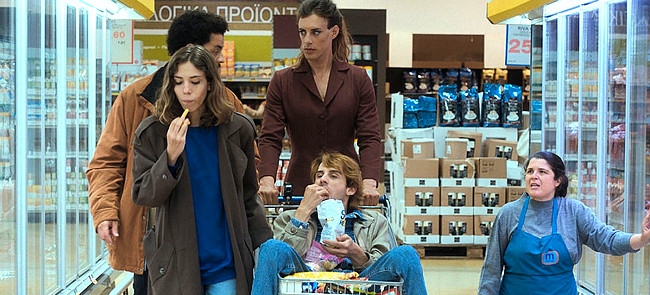 From Greece, this offbeat drama stirs superficially queer elements into a crime thriller that follows a young woman's odyssey into a colourful underworld. While skilfully observing the characters, writer-director Christos Massalas relies too heavily on voiceover, leaving little to discover along the way. So while the setting ripples with knowing details, the storytelling is awkward and elusive. And the film is never as transgressive as it pretends to be. Running from her powerful mother's goons, stripper Nelly (Lekakou) is rescued by petty thief Markos (Apostolou), who takes her to Broadway, an abandoned Athens shopping mall where he and a makeshift family live in derelict theatres, using street performance as a cover to pick pockets. This includes young couple Rudolph and Mohammad (Papad and Talbi), landlord Paul (Politis) and pet monkey Lola. But Nelly becomes intrigued by the injured Jonas (Papadopoulos), hiding in a closet from a crime boss. So he can go outside, Nelly transforms Jonas into Barbara, and they develop an act together. Life for these characters is filled with little twists and turns. Nelly's joyless sex with Markos is contrasted with passionate romps with Jonas, although the film only vaguely nods at the romantic connection between Rudolph and Mohammad. The narrative centres around Markos' arrest and imprisonment, which gives Nelly space to develop her much stronger connection with Jonas. So Markos' return is dark and rather absurdly menacing. It also sends the plot in a direction that feels clumsy, never quite grabbing the attention because Massalas only focusses on cool-looking surfaces. Performances are engagingly understated, adding an intriguing edge to characters who are hiding things about themselves. As Nelly, Lekakou has a terrific matter-of-fact quality, so it's easy to see why she becomes such an important member of this scrappy clan. Although for the audience, she'd be far more engaging without her overwritten voiceover. Papadopoulos is more enigmatic, revealing a likeable personality in small moments. And Apostolou has strong presence in a tricky role as Markos, who shifts from shady charmer to loathsome villain rather uneasily. It's frustrating that Massalas touches on meaningful issues without grappling with them. Most glaring are ideas about gender identity and sexuality, which run right through the middle of the story but remain resolutely untouched. So an army of drag queens that rescues Jonas is merely a cheap device. While timidly averting his gaze from this side of things, Massalas plays heavily on a cockroach metaphor, straining to suggest that these not-so-outrageous people are social pests. Which undermines any possible point.
| ||||
|
I Love You, Beksman Mahal Kita, Beksman Review by Rich Cline | 
| |||||
 dir Perci Intalan scr Fatrick Tabada prd Vincent Del Rosario III, Veronique Del Rosario-Corpus with Christian Bables, Keempee de Leon, Katya Santos, Iana Bernardez, Donna Cariaga, J-Mee Katanyag, Lei Ramos, Gene Padilla, Mico Aytona, Migs Almendras, Kyo Quijano, Gerard Acao release Ph 16.Nov.22, UK Apr.23 qef 22/Philippines 1h46 QUEER EAST FEST Is it streaming? |
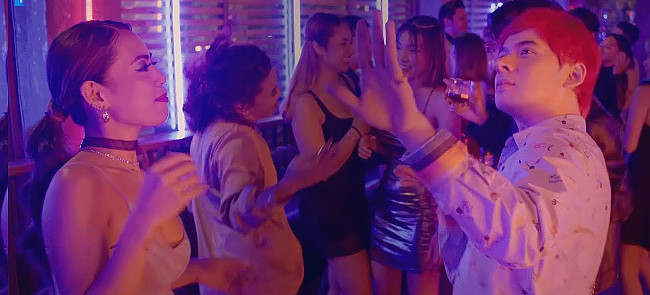 Lurid colours and wacky humour keep this lively Filipino comedy bouncing along, almost distracting us from the deeper, darker issues it is exploring. Most impressive is how director Perci Intalan skilfully avoids letting the gimmicky comedy tip over into pastiche, keeping the story and characters grounded even while playfully poking fun at cliches. What emerges is hugely entertaining, and also a pointed exploration of the nature of masculinity. In Manila, the flamboyant Dali (Bables) works out of the salon run by his parents (de Leon and Santos) as a designer and makeup artist, alongside his best pals (Katanyag and Ramos). Then at a beauty pageant he is smitten with gorgeous contestant Angel (Bernardez). But no one believes Dali is straight, including Angel. So he dyes his red hair back to natural black, drains colour and style from his clothing, and takes on manly pursuits like weightlifting and car mechanics to impress Angel's dad (Padilla) and brothers. Which of course creates an identity crisis. Raised by his mother, gay dad and dad's boyfriend (Aytona), Dali has grown up free to be his colourful self and develop his talent as a stylist. So coming out as straight throws him off balance, leaving him wondering who he is within his rainbow family. The film's jaunty tone leaves no questions about where this is headed, and the soul-searching plays out with a mix of silliness and melodrama. But the underlying issues resonate in surprising ways with the audience. The cast is energetic, bubbling over with big emotions. And while each character has a somewhat stereotypical persona, actors get the chance to subvert this along the way. Bables is hugely charming as Dali, an openly expressive young man who struggles to suppress himself. The way his emotions continually burst out is cleverly observed, and it builds a strong sense of connection with the ensemble around him, each of whom find an engaging sparks of personality to bring their characters to vivid life. Along the way, Intalan offers superbly warped nods to gender-based classics like La Cage Aux Folles. And without ever preaching, the movie continually finds new ways to make comments about what it means to be a man. Most important is how it highlights how society's usual notions of masculinity are superficial and utterly irrelevant, and that true power comes from having the courage to be yourself even when everyone wants you to be someone else.
| ||||

See also: SHADOWS FILM FESTIVAL © 2023 by Rich Cline, Shadows
on the Wall
HOME | REVIEWS | NEWS | FESTIVAL | AWARDS
| Q&A | ABOUT | TALKBACK | | ||||


